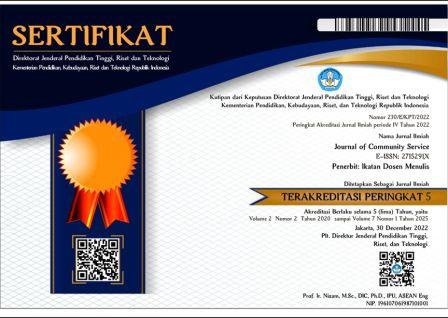DEVELOPMENT OF SOCIAL VALUES AMONG MADRASA STUDENTS
Abstract
This This study aims to determine the development of social values in madrasah students. This research was conducted in the area of West Java, Banten and DKI Jakarta. The research was conducted on madrasah students with the proportion at primary, Yunior High School and Senior High School. This study found that character development among madrasah students has effectiveness by developing models of developing character education in the form of teaching, habituation, imitation, motivation and enforcement of rules. Social values are taught in every activity, both in the madrasa and in the Islamic boarding school for those under the Islamic boarding school. Values education is oriented towards improving the character and attitudes of students in social life. The instilled social values also vary, including religious values, independence values, and responsibility values. The application of value education has effectiveness in strategy, program, process, and evaluation and has an integral form where one element with the other has a multiplayer effect. The elements that exist are theoretically inseparable so that the success of a character education in Islamic boarding schools is shown by the synergy of these elements.
References
ACIL Allen Consulting. (2017). Evaluation of the Higher Education Participation and Partnership Program, Report to Department of Education and Training Melbourne, VIC.
Appadurai, A. (2004). The capacity to aspire: Culture and the terms of recognition. In V. Rao and M. Walton (Eds), culture and public action. Stanford, CA: Stanford University Press.
Archer, L. (2007). Diversity, equality and higher education. A critical reflection on the abuses of equity discourse within widening participation. Teaching in higher education.
Ahmad, M. (2021). Teaching ethics in the era of technology: Exploring the possibilities and challenges. Journal of Education and Learning, 10(2), 143-150.
Beauchamp, T. L., & Bowie, N. E. (2004). Ethical theory and business. Upper Saddle River, NJ: Prentice Hall.)
Beatty, A. (1999). Varieties of Javanese Religion: An Anthropological Account. Cambridge University Press, Cambridge.
Dizon, J. M. (2020). Promoting ethical behavior in the age of technology. International Journal of Humanities and Social Science Research, 8(1), 1-9.
Hunter, J. D. (2000). The death of character: On the moral education of America's children. Basic Books.
Kirschner, P. A., & De Bruyckere, P. (2017). The myths of the digital native and the multitasker. Teaching and Teacher Education, 67, 135-142.
Lickona, T. (1991). Educating for character: How our schools can teach respect and responsibility. New York: Bantam Books.
Ophir, E., Nass, C., & Wagner, A. D. (2009). Cognitive control in media multitaskers. Proceedings of the National Academy of Sciences of the United States of America, 106(37), 15583-15587.
Rokhman, F., & Subanji. (2021). Ethical education in digital era: Conceptualizing ethics in technology. Journal of Social Studies Education Research, 12(1), 141-156.
Rosen, L. D., Whaling, K., Carrier, L. M., Cheever, N. A., & Rokkum, J. (2013). The media and technology usage and attitudes scale: An empirical investigation. Computers in Human Behavior, 29(6), 2501-2511.
Seligman, M. E. (2011). Flourish: A visionary new understanding of happiness and well-being. Free Press.
Shaw, T. (2021). Promoting ethical literacy in a technology-rich world: A case for moral education. Ethics and Education, 16(1), 86-102.
Subrahmanyam, K., & Šmahel, D. (2011). Digital youth: The role of media in development. New York: Springer.
Twenge, J. M., Campbell, W. K., & Freeman, E. C. (2012). Generational differences in young adults' life goals, concern for others, and civic orientation, 1966-2009. Journal of Personality and Social Psychology, 102(5), 1045-1062.
Velazquez, M. (2018). Ethics. Palgrave Macmillan.
Willingham, D. T. (2010). Why don't students like school?: A cognitive scientist answers questions about how the mind works and what it means for the classroom. San Francisco: Jossey-Bass.
Zainuddin, A., & Liu, Y. (2018). Teaching and learning with technology: Effectiveness of ICT integration in schools. International Journal of Emerging Technologies in Learning, 13(10), 188-209.




















